Good morning!
Greetings in the name of the Father, the Son, and the Holy Spirit.
So humble yourselves before God. Resist the devil, and he will flee from you. (James 4:7)
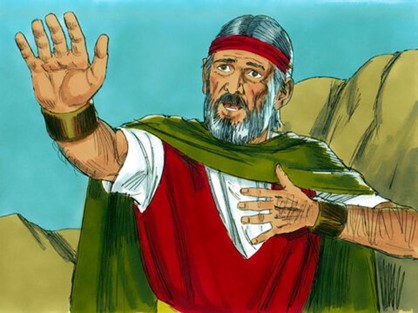
God called Moses for the same mission that he failed forty years ago. Moses refused again and again because he did not want to be hurt again by his own people. Moses was too confident to trade his prince position with his lofty goal of freeing his fellow Israelites enslaved in Egypt. When an opportunity came, he pulled the trigger. Moses expected his own people would support him, and he would perform the monumental task of leading his fellow Israelites about two million out of Egypt to the land God promised.
But his people rejected Moses. Moses ran for his life. His people accused Moses as a common murderer, although Moses killed an Egyptian slave driver to signal that he was the liberator who would free them from slavery. Soon Pharaoh, the king of Egypt, knew about Moses’ killing of one Egyptian slave driver, and the king of Egypt ordered to capture Moses to execute him. Then Moses hid from all Egyptians and his fellow Israelites.
Although Moses refused and refused the same failed mission, God convinced Moses by transforming the staff in Moses’ hand into God’s staff. Then God demonstrated the supernatural power of the staff and promised to send Aaron, his older brother, as his helper. Moses then returned to his people in Egypt. His brother, Aaron, welcomed Moses and introduced Moses to the Israelites still enslaved in Egypt. All received Moses warmly, which enormously encouraged Moses because the same people who had rejected Moses now welcomed him.
Then Moses went to Pharaoh with Aaron and the elders of the Israelites to get freedom from slavery but failed. There were multiple reasons why Moses failed. First, Moses could not deliver wholesomely and accurately to Pharaoh. It was Moses’ sin because Moses did not 100% rely on God, but he compromised God’s message by adding his own effort to fulfill God’s command.
Second, God hardened Pharaoh’s heart. God prewarned Moses about this, but Moses did not hear. Moses was excited about God’s promise to free his fellow Israelites using him. Why did God harden Pharaoh’s heart? It is truly an excellent question. We will know about the reason later.
Then Moses returned to God and prayed. Moses asked why he failed, and God who loved Moses, revealed Moses’ sin to Moses’ understanding. Then Moses asked for God’s forgiveness, and God forgave him. Soon God sent Moses again to Pharaoh. Then Moses expressed his concern about his past inability to speak to Pharaoh. God heard Moses’ concern and promised Moses he would not have to say or do anything because God let Aaron do all for Moses.
Moses went back to Pharaoh with Aaron. For this time, as God promised to Moses, Aaron did everything. Aaron said to Pharaoh and performed God’s miracle. Moses was just there while watching what Aaron was doing. Yes, Moses did not do any real work for this time. Even so, he wanted to see God’s victory over Pharaoh. Moses believed the staff of God that God gave to him at Mount Horeb would overpower Pharaoh. Then Pharaoh surely repented and released the Israelites from Egypt.
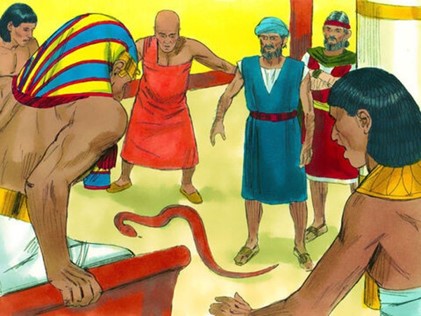
Moses watched Aaron, who threw down his staff before Pharaoh and his officials, and it became a serpent. Surprisingly, Pharaoh was calm, and he called his own magicians to do the same magic. The Egyptian magicians placed their staffs, and all became serpents. Then the Pharaoh’s serpents attacked God’s serpent, which devastated Moses. Moses believed God’s power, but the reality was not what Moses expected.
Moses could not watch God’s serpent anymore, losing out against the Pharaoh’s serpents. Moses closed his eyes, which helped Moses isolate himself from the painful reality before him and his emotion. As quieting down his mind and heart, Moses started hearing God’s voice. Moses paid close attention to the subtle and loving voice. Then it did not take long before Moses began praying to God without knowing. Yes, it was the moment for which God patiently waited. God kept watching for Moses till Moses became humble and prayed fervently to God. In response to Moses’ humble and fervent prayer, God poured His Spirit. Then Moses gave all his heart, including his desires and sins, and God gladly accepted. Moses regained his spiritual strength and got out of the bottomless pit of depression and disappointment.
Moses opened his eyes and saw a completely different scene. God’s serpent was overpowering Pharaoh’s serpents and began to shallow Pharaoh’s serpents one by one. What an amazing scene! It was not long before God’s serpent alone was there waiting for Aaron. Aaron picked the serpent by the tail, and the serpent turned back to the staff of God. However, Pharaoh’s heart remained hard. He still refused to listen. For this time, Moses remembered it just as God had predicted.
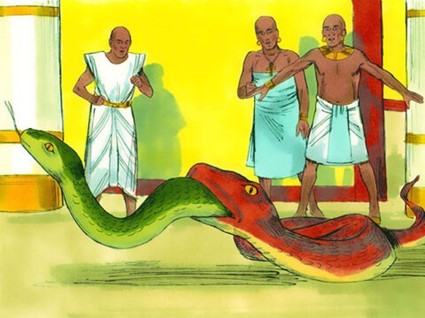
It was a crucial moment for Moses. Moses had just learned how to overcome his fear and unbelief. He gave up all his human desires and expectations as he saw the losing battle. Then he closed his eyes to detach from what was going on, heard God’s subtle voice, and prayed to God. Upon Moses’ prayer, God touched Moses. God loved Moses and gave him an understanding of his fault and unbelief, and Moses responded with his prayer of repentance. In turn, Moses received God’s comfort and peace in the middle of the painful reality of losing the battle with Pharaoh.
The interaction between Moses and God is true for all. God does not rejoice over us because we did God’s work. Instead, God truly rejoices over us when we love God and trust Him 100% even in a situation where we don’t see the outcome that we wanted, although we have fully dedicated all that we have for Him with our faith, including our hearts, minds, souls, time, and possessions. It is truly tough to do, but Jesus Christ did. Jesus Christ humbly followed God’s will while trusting in God under all circumstances. It is an example of our true humility to God.
God called Moses again, and Moses has heard God carefully and fully. God commanded Moses to go and deliver God’s message to Pharaoh while warning Moses that Pharaoh’s heart would be stubborn and still refuse to let His people go. Moses could have asked why God let Pharaoh’s heart be hardened, but he did not. Moses learned how to be humble before God, by being absolute obedience to God and His Will. Later God said that Moses was the most humble person on earth.
Now Moses was very humble—more humble than any other person on earth. (Numbers 12:3)
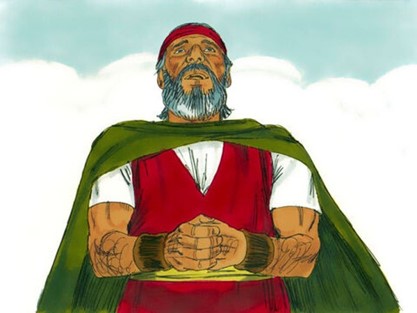
Moses did not argue with God anymore. Instead, Moses humbly accepted God’s command and followed through God’s command. He boldly led Aaron, and Aaron followed. Aaron did what Moses asked him to do. As the staff of God went in to the River of Nile, the entire river became blood. The fish in the river died, and the water became so foul that the Egyptians couldn’t drink it. There was blood everywhere throughout the land of Egypt. But again, the magicians of Egypt used their magic, and they, too, turned water into blood. So Pharaoh’s heart remained hard. He refused to listen to Moses and Aaron, just as God had predicted. Moses knew Pharaoh’s stubbornness before performing God’s plague on the water of the Nile River. Thus, Pharaoh’s stubbornness could not impact Moses’ faith at all.
However, the Sinning of Pharaoh impacted everyone’s life in Egypt. Due to the plague, both Egyptians and Israelites suffered. Yes, sometimes people suffer not because of their sins but because of someone else’s sins, like Pharaoh or a national leader. Thus, we need to pray to God. Here comes God’s Word:
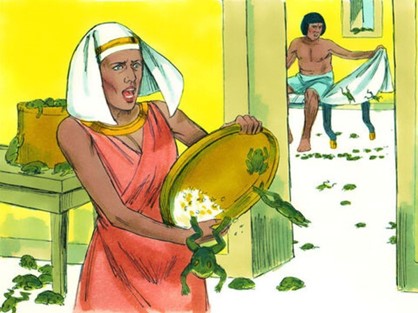
I urge you, first of all, to pray for all people. Ask God to help them; intercede on their behalf, and give thanks for them. Pray this way for kings and all who are in authority so that we can live peaceful and quiet lives marked by godliness and dignity. This is good and pleases God our Savior, who wants everyone to be saved and to understand the truth. (1 Timothy 2:1-3)
First, God wants us to pray for all, not only for the believers but also for non-believers. God says our prayer should be God’s help on all of them, our intercession on their behalf, and give thanks for them.
Asking for God’s help or our intercession for others is not easy, but it is relatively doable compared to our thanks to God for those who harm us. We might understand why we pray for God’s help and our intercession for others, which often our hearts warm, but how about giving thanks to God for the others? Especially, can we imagine that we thank God for those who are against and even harming us? Yes, it is truly tough to do so.
Then God says we should pray to God for kings and all in authority. Why? Bible tells us that we can live peaceful and quiet lives marked by godliness and dignity. Who does not want peaceful and quiet lives with family and loved ones? No one. There are indeed truly eccentric leaders. Even so, we should pray for all in authority, although some are too eccentric to understand their minds at all.
Amazingly, our prayer is not only for the peace and tranquility of our lives on earth but also for godliness and dignity in Him. In other words, setting us apart from the world and being godly in all circumstances by living out Godly lives and being respected by both believers and non-believed should be our prayer. Then, what would be our lives that reflect our prayer? Put others higher than us and live out Godly lives by loving God and others and always be patient and humble to God and people.
If we live as described above, we will surely please God, our Savior, Ever-Loving Father. Our God wants everyone to understand this truth and be saved in Him. Please look around. How many people truly understand this truth? And also look into ourselves. Do we really love God and others in all circumstances, regardless others do good to us or harm us?
Even today, on earth, we see lots of pain. Then what should we do? Pray to God and ask God to help them; intercede on their behalf, and give thanks for them. Not only for those who are good to us but also for those who are in the way, taking away the precious possessions that we painstakingly build for a long time using a cunning and vicious plan, and then using them against us to harm us. Yes, we admit that it is impossible to do as a mere human because we are naturally programmed to protect what we have and who we are against any harm or being taken advantage of by others. Then what can we do?
Here is good news. Someone exactly knows what we feel and our struggles because He personally experienced what we go through on earth every day. His name is Jesus Christ. He gave all He had, and he did not return evil for evil but gave His love and forgiveness.
Even now, Jesus Christ sympathizes with all our sufferings because He had the same or even greater injustice and suffering. Then we can ask why did Jesus had to go through such injustice and suffering but gave back with His love and forgiveness. It was God’s love and mercy for us all. It is impossible, but in Him, it is possible. “[God] wants everyone to be saved and to understand the truth.” Yes, everyone is the object of God’s love and patience.
Humble yourselves before the Lord, and he will lift you up in honor (James 4:10)
As Jesus was humbly obedient to His death on a cross, God lifted Him up high in honor.
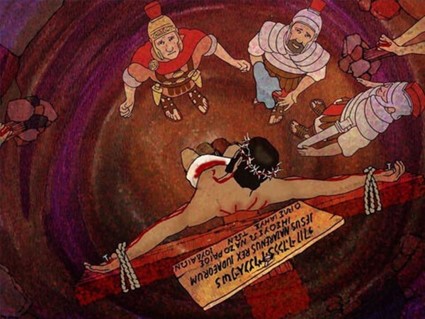
When he appeared in human form,
he humbled himself in obedience to God
and died a criminal’s death on a cross.
Therefore, God elevated him to the place of highest honor
and gave him the name above all other names,
that at the name of Jesus every knee should bow,
in heaven and on earth and under the earth,
and every tongue declare that Jesus Christ is Lord,
to the glory of God the Father. (Philippians 2:7b-11)
Moses was neither disappointed nor dismayed because Moses tasted God’s unfathomable love and God’s infinite patience. He knew more about the truth. When Pharaoh hardened his heart again, Moses quickly returned to God and humbly prayed. Moses did not argue with God anymore. Indeed, Moses graduated from the elementary nature of arguing with God, equating himself with God. Moses no longer doubted the applicability of God’s command. Once Moses felt that he knew more than God about his failure. Moses used to refuse and resist God till God changed. Moses used to feel he was wiser than God. Now Moses came to a true understanding of God, and the truth — how much he was wrong before God and how much God was patient in His love.
The heart of man plans his way, but the LORD establishes his steps. (Proverbs 16:9)
Moses again went back to Pharaoh without any reservation because God commanded not because Moses expected to get what he wanted. Indeed, Moses knew he would not get what he wanted because Pharaoh would not let his people go by hardening his heart as God warned. How about us? Do we put all our attention on the outcome rather than God? If so, we should ask ourselves, which one do we work for, the outcome or God? Moses 100% trusted in God, not working for the outcome that he wanted to have.
Moses boldly proclaimed God’s message to Pharaoh while 100% trusting God, not expecting to get the outcome. Of course, Moses preferred to have the outcome he wanted, but Moses gave it to God as a part of his prayer. Per God’s command, Moses asked Aaron to raise the staff of God over the waters of Egypt. Frogs came up and covered the whole land.
However, Pharaoh’s magicians could do the same thing with their magic. They, too, caused frogs to come upon the land of Egypt. Even so, Pharaoh got into fear. What did make Pharaoh fear? Moses’ firm faith in trusting God not God’s power of plaguing with countlessly many flogs. Pharaoh’s magicians could do the same. Moses won the victory without going through an actual dual between the power of God and that of the Pharaoh’s magicians, as God’s serpent and Pharaoh’s serpents fought before. And although God’s serpent swallowed up all Pharaoh magician’s serpents, Pharaoh did just simply harden his heart. Yes, Moses’s faith, not God’s power displayed before Pharaoh’s eyes, made Pharaoh fearful.
Pharaoh summoned Moses and Aaron and begged, “Plead with the LORD to take the frogs away from me and my people. I will let your people go, so they can offer sacrifices to the LORD.” It was the faith, not the miracle or magic of God. Moses’ faith gave the victory, not the plague poured down from heaven as a form of flogs.
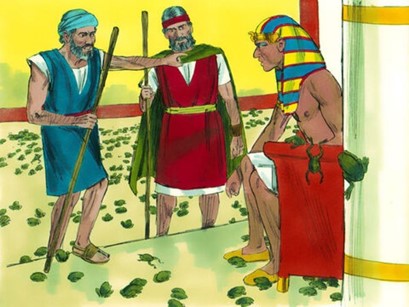
However, Pharaoh hardened his heart again when Moses stopped the flog plague. Moses, of course, was not surprised at the outcome. Moses knew Pharaoh would harden his heart as God had predicted. It is one great example of God’s wisdom for us who live in a world filled with conflicts and disappointments.
If we only chase down what we want while expecting the desired outcome, how different are we from those who do not believe in God? If we do, can we say we believe in God while 100% trusting Him under all circumstances?

Trust in the Lord with all your heart
and lean not on your own understanding;
in all your ways submit to him,
and he will make your paths straight. (Proverbs 3:5-6)
